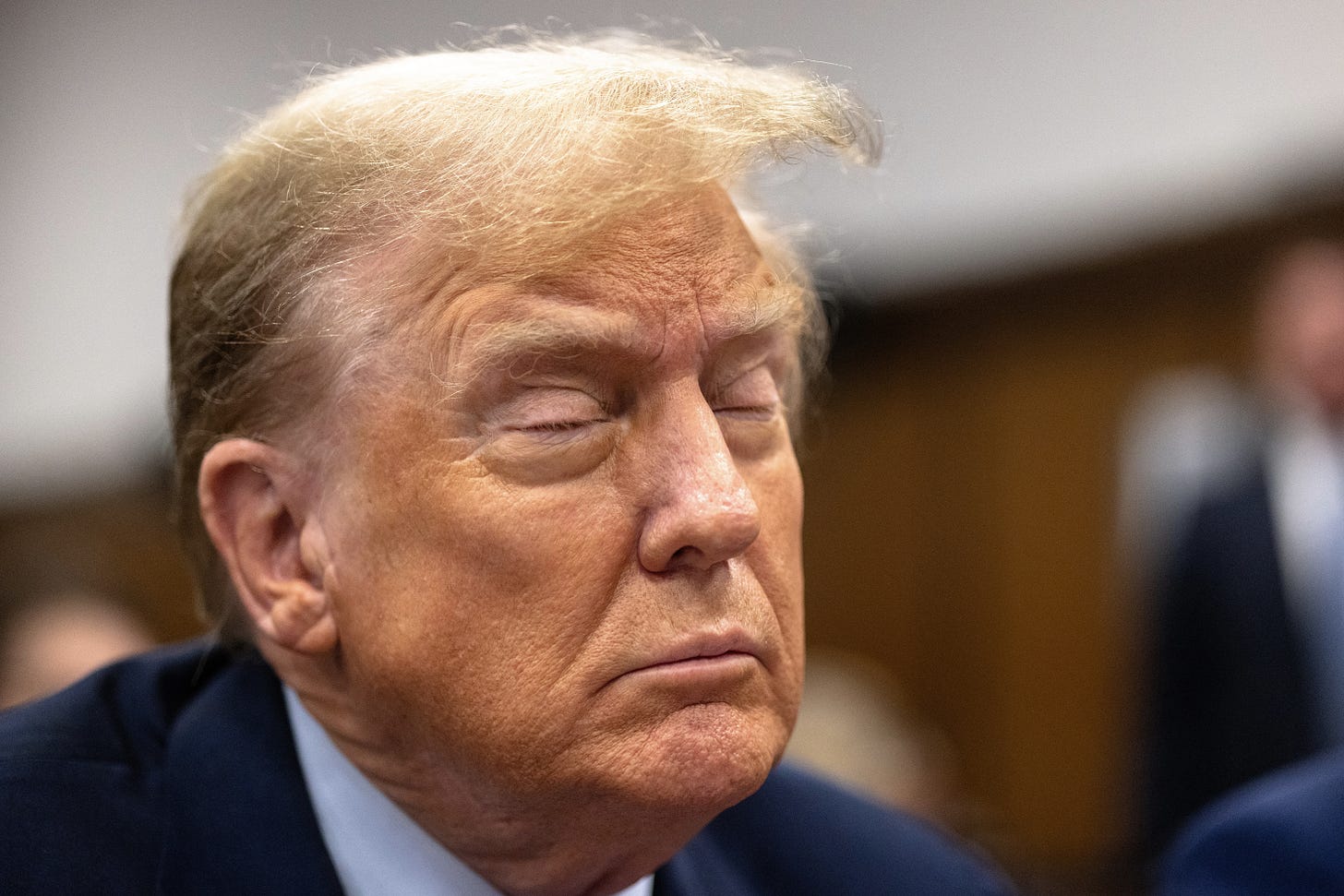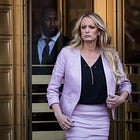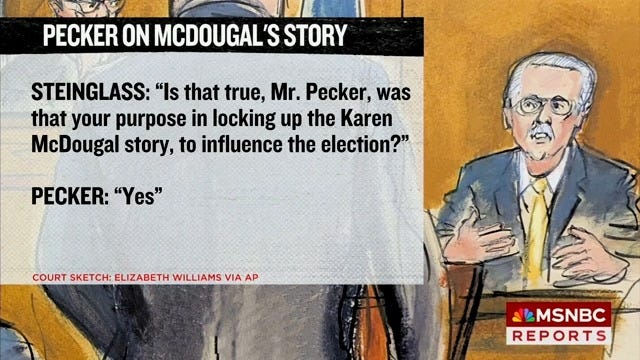Trump's criminal trial is off to a bad start for him
He's low energy both inside and outside the courtroom.
PN is a reader-supported publication made possible by paid subscribers. If you aren’t one, please click the button to support our independent journalism.
Not so long ago, Donald Trump’s camp signaled that he planned to use his criminal hush money trial as an opportunity to campaign from the courthouse. But the opening weeks of the proceedings showed how hard it’s going to be for the presumptive GOP presidential nominee to make chicken salad out of chicken bleep.
Trump has today off from the trial. Still, tomorrow, he again will be firmly, grumpily, and sleepily nestled in the confines of the Manhattan courthouse that is his daytime home until his hush money trial finally ends — which won’t be anytime soon.
Thanks to New York’s relatively strict laws regarding media access to courtrooms, Trump’s trial has what is, for Trump, the precisely wrong level of exposure. New York doesn’t allow cameras or live audio, and it’s only because of the extraordinary nature of the proceedings that the court administration decided to make daily transcripts of the trial available for free on the court’s official website. Transcripts can run to thousands of dollars for a single day and are not usually turned around within 24 hours.
So, with the proceedings not entirely behind closed doors, Trump can’t outright lie about what transpired. But the lack of cameras and real-time coverage also means Trump can’t turn things into a circus by engaging in ridiculous behavior to distract media attention from the trial’s substance. When you combine this with the fact that the judge, not Trump, is wholly in control of the order of proceedings each day, this has to be one of the most maddening and humiliating experiences imaginable for him.
Trump can slake his thirst for attention and deploy his clumsy attempts to derail the narrative only a few times per day, when he is swarmed by media entering or exiting the courtroom. On those occasions, he goes on brief, highly repetitive rants that generate nothing but negative headlines for him.
Perhaps worst of all for Trump, even his most diehard supporters don’t seem all that interested in trekking to Lower Manhattan. Trump is self-soothing over this, spinning an easily disprovable yarn that the courthouse is an “armed camp to keep people away” and that officials are turning around thousands of his supporters. Instead, CNN journalists attending the trial have said there have been days where the teeming number of MAGA faithful can be measured in single digits.
No wonder Trump is itching to get back on the campaign trail, where his fact-free musings can be greeted with roars of approval from the adoring and there’s no pesky judge to tell him to behave. It appears he will have a brief chance to do so, given that Merchan moved Trump’s second gag order contempt hearing from Wednesday to Thursday of this week, which frees Trump up to attend an already-scheduled swing-state rally in Michigan on Wednesday. Judge Merchan didn’t explain the date change, but it doesn’t seem far-fetched to conclude that he’s continuing his apparent attempts to appeal-proof the proceedings by giving Trump more leeway than any other criminal defendant.
Contempt hearings as a way of life
This week’s contempt hearing will be the second in as many weeks. Last week, prosecutors asked the judge to hold Trump in contempt for 10 violations of the gag order that prohibits him from making public statements attacking witnesses, jurors, court staff, and their families.
That hearing featured Trump’s attorney, Todd Blanche, trying to make a “retweets aren’t endorsements” argument stick, arguing that Trump isn’t violating the gag order by reposting Truth Social posts that would violate the order had Trump directly posted them himself. Even that feeble attempt fell apart almost immediately when Blanche was forced to admit that a post where Trump ostensibly quoted Fox News host Jesse Watters (see below) was actually a hybrid of Watters’s words and Trump’s.
It isn’t just Merchan who is treading lightly regarding imposing any consequences on Trump for his repeated and willful refusal to follow the gag order. Prosecutors, a breed not normally known for restraint when dealing with criminal defendants with a propensity for breaking court orders, haven’t yet sought any jail time for Trump. For Trump’s first contempt hearing, they asked for only the maximum fine of $1,000 per violation, or $10,000 total. That’s literally pocket change versus the hundreds of millions of dollars of penalties Trump owes related to the E. Jean Carroll and the New York civil fraud case.
Yes, it’s a criminal rather than a civil penalty. But in the end, it’s just a small amount of money, and it doesn’t seem to deter Trump in the slightest. Judge Merchan didn’t even have time to rule on the first contempt motion before prosecutors were forced to bring the second one. This one involves four additional alleged violations.
Trump went after Michael Cohen, his former fixer and current tormenter, twice in recent days, once in a television interview and once in a reporter scrum. Trump then gave an interview claiming the jury was 95 percent Democrats. Finally, Trump called former National Enquirer publisher David Pecker, who spent a good deal of time on the stand last week, “a nice guy.” Prosecutors allege this was a coded message to Pecker, telling him to be nice or face further attacks. While the last might seem a bit farfetched, the rest are pretty objectively violative of the restrictions in the gag order. It isn’t clear yet whether prosecutors will ask Trump to face jail time for the additional violations, but what is clear is that the threat of fines does not have the desired effect of curbing Trump’s behavior.
A note from Aaron: Working with brilliant contributors like Lisa requires resources. If you aren’t a paid subscriber, please click the button below to support our work.
It’s often tempting to attribute evil genius abilities to Trump rather than acknowledge that he’s simply been a bully for so long that he figures he can always get away with it, so the repeated violations are most likely because Trump can’t and won’t control himself. Still, engaging in willful multiple high-profile violations of the gag order may also have a strategic component. Every time Trump makes a statement that may violate the gag order, prosecutors must flag it and put it in a contempt filing. Doing so kicks off additional publicity for those violations, as the media then reports on and links to each violation.
Trump’s attacks then dominate the media cycle even while he’s cooped up in the courtroom. The media then, rightfully, has to report on the contempt hearing itself, and while watching Todd Blanche beclown himself on behalf of his terrible client may be fun, it still has the net effect of keeping Trump’s attacks on witnesses and the jury in the spotlight. Finally, these hearings delay the trial's progress, which means neither the jury nor the public hears from the prosecution’s witnesses while all this gets sorted.
Trials can be boring affairs, even when it is a bombshell criminal prosecution of a former president. In part, that’s because prosecutors, when presenting their case, have to prove even the most boring things, such as showing that Michael Cohen opened a bank account for Resolution Consultants, his LLC created solely to disguise Trump’s hush money payments. That requires putting someone like Gary Farro, a former senior director at First Republic Bank, on the stand to testify about emails from October 2016 when the account was being opened. It’s not earth-shattering stuff, but it’s how prosecutors were able to get in the record that Cohen signed an affirmation that the LLC wouldn’t be handling political contributions, as those contributions trigger an additional review by the bank. Farro’s testimony also shows Cohen was a bit frenzied, trying to open multiple business accounts to fund and distribute the hush money payments to Stormy Daniels.
It also requires putting someone like Trump’s former assistant, the still-loyal Rhona Graff, on the stand. Graff gushed about how exciting it was to work for Trump, but her purpose on the stand was to elicit testimony that she entered contact information for both Stormy Daniels and Karen McDougal into the Trump organization’s directory. Daniels, of course, received $130,000 from Cohen to keep quiet about an affair with Trump, while Karen McDougal received $150,000 from David Pecker in a catch-and-kill scheme where she was paid for the rights for her story of sleeping with Trump even though National Enquirer never ran it.
Showing that Trump had contact info for Daniels and McDougal bolsters the prosecution’s case that Trump oversaw the hush money efforts. Trump’s stance is that he did not have sex with Daniels or McDougal, a position that is likely absolute hell for his lawyers to defend, as the paper trail of payoffs to both women is substantial. The defense argument is that Trump paid off Daniels to spare his family embarrassment, not to ensure he got elected. That argument has some merit in that if the reason for the payoff was not related to influencing the electoral outcome, it arguably isn’t nearly as big a deal. However, the defense team could still put that defense forward without having to accommodate Trump’s dubious claim that he didn’t sleep with Daniels.
Pecker’s testimony didn’t help Trump
David Pecker, who got the most ink last week, was on the stand for four days, testifying generally about the long history of National Enquirer’s sleazy practices of buying and burying stories that could hurt the right-wing politicians he counted as friends.
Regarding Trump specifically, Pecker admitted under questioning from prosecutors that he entered into the catch-and-kill agreement with McDougal to suppress her story so that it wouldn’t influence the election and he did so because “I wanted to protect my company, I wanted to protect myself and I wanted, also, to protect Donald Trump.”
It isn’t yet clear who the prosecution will put on next. Eventually, Stormy Daniels will be testifying, as will Karen McDougal and Michael Cohen. Hope Hicks is also expected to testify, as she was on phone calls where Trump and Cohen discussed the payoffs. Potential jurors were given a list of 41 potential witnesses, ranging from Steve Bannon to Kellyanne Conway to Dan Scavino.
Trump has been talking a big game about how he will testify in his own defense, but it’s hard to believe he’d actually subject himself to days of withering cross-examination from prosecutors. Given that the trial is expected to last several weeks, he has time to decide. Meanwhile, he just has to try to stay awake.
That’s it for today
We’ll be back with more Wednesday. If you enjoy this post, please support Public Notice by signing up. Paid subscribers make this work possible.
Thanks for reading.







It would seem to me that the case against Trump looks pretty bullet proof but I almost hope that a die hard Trump supporter has smuggled his/her way onto the jury and holds firm. That would mean a re-trial so Trump can enjoy himself in court for a second go round.
There is a lot of projection going on when the Trump team accuses the judge, prosecutor, or Democrats of lawfare.